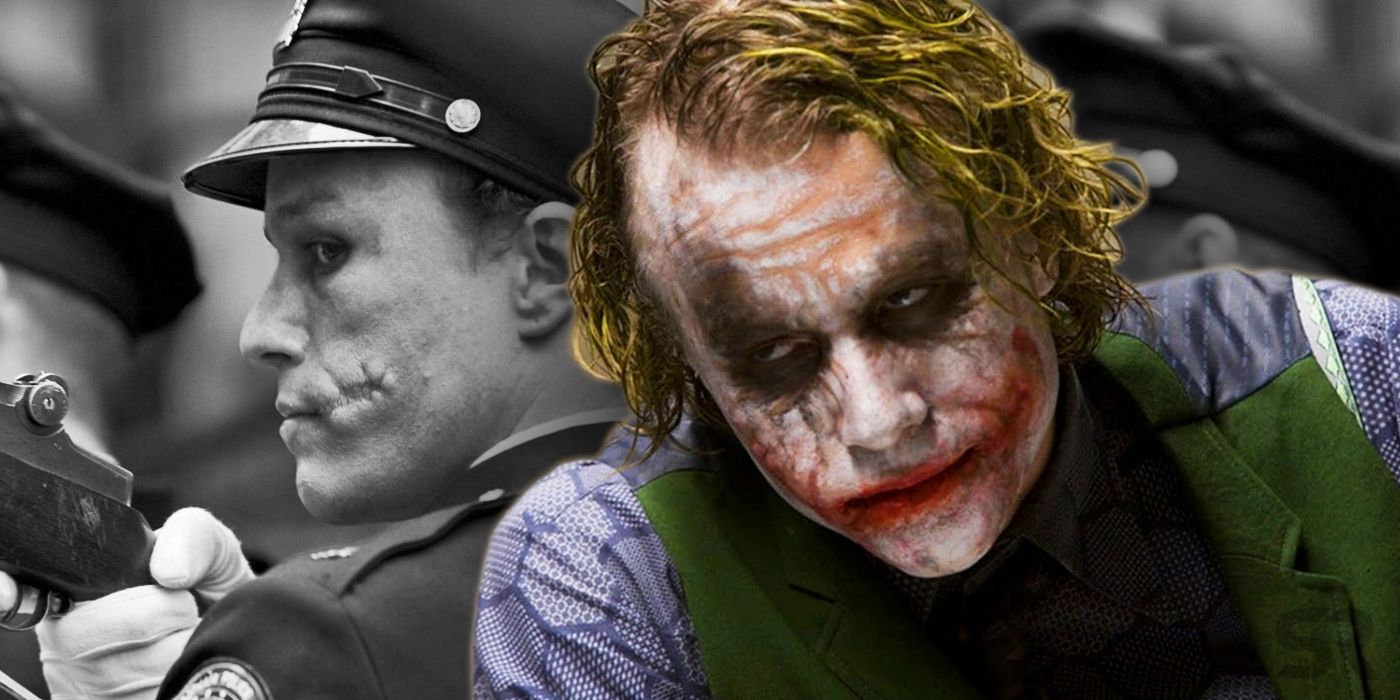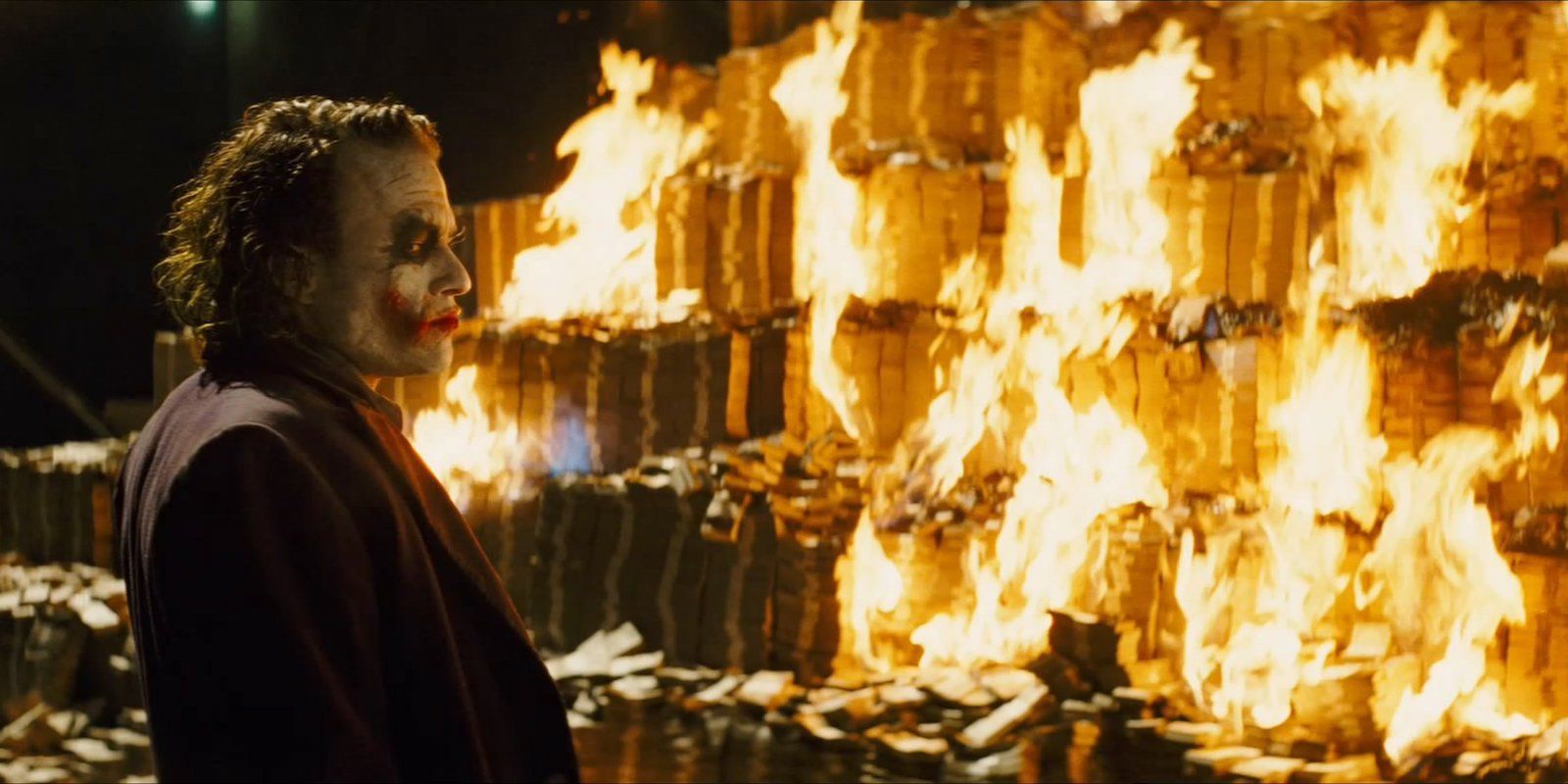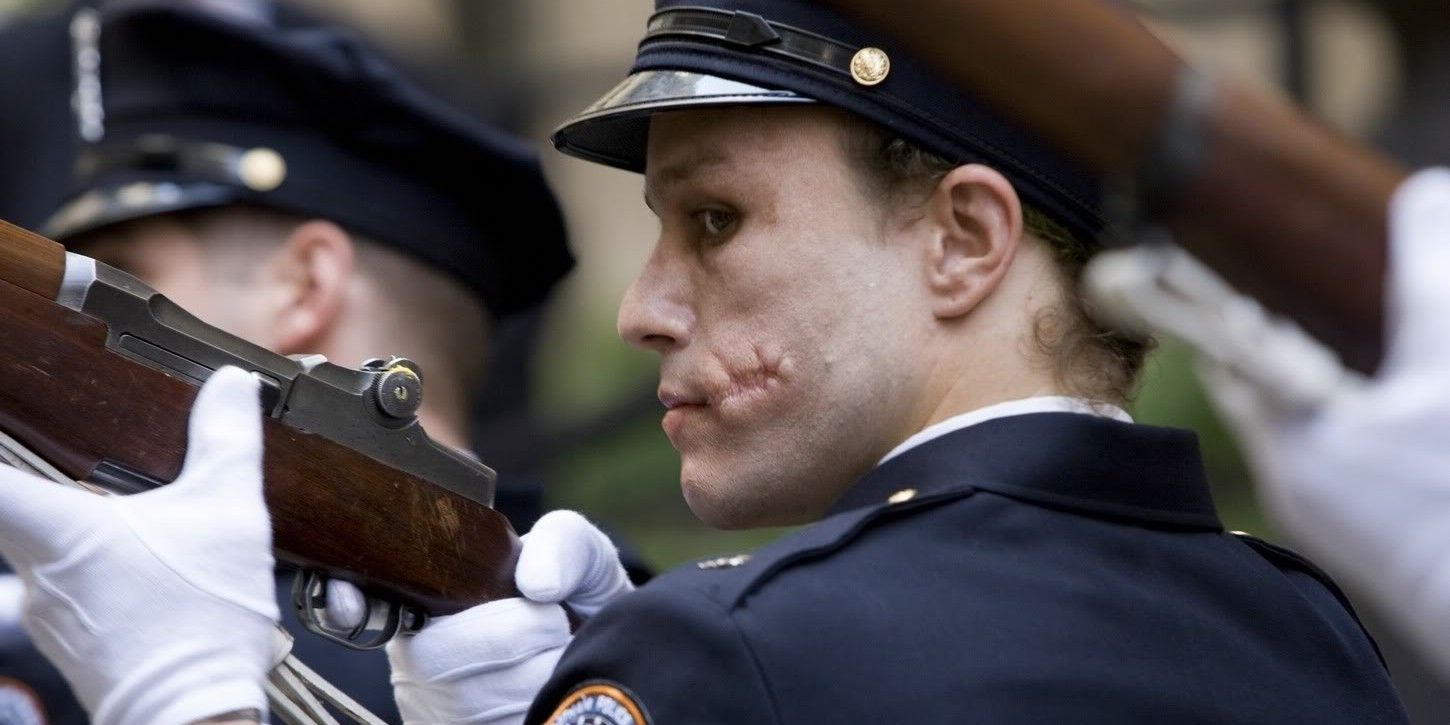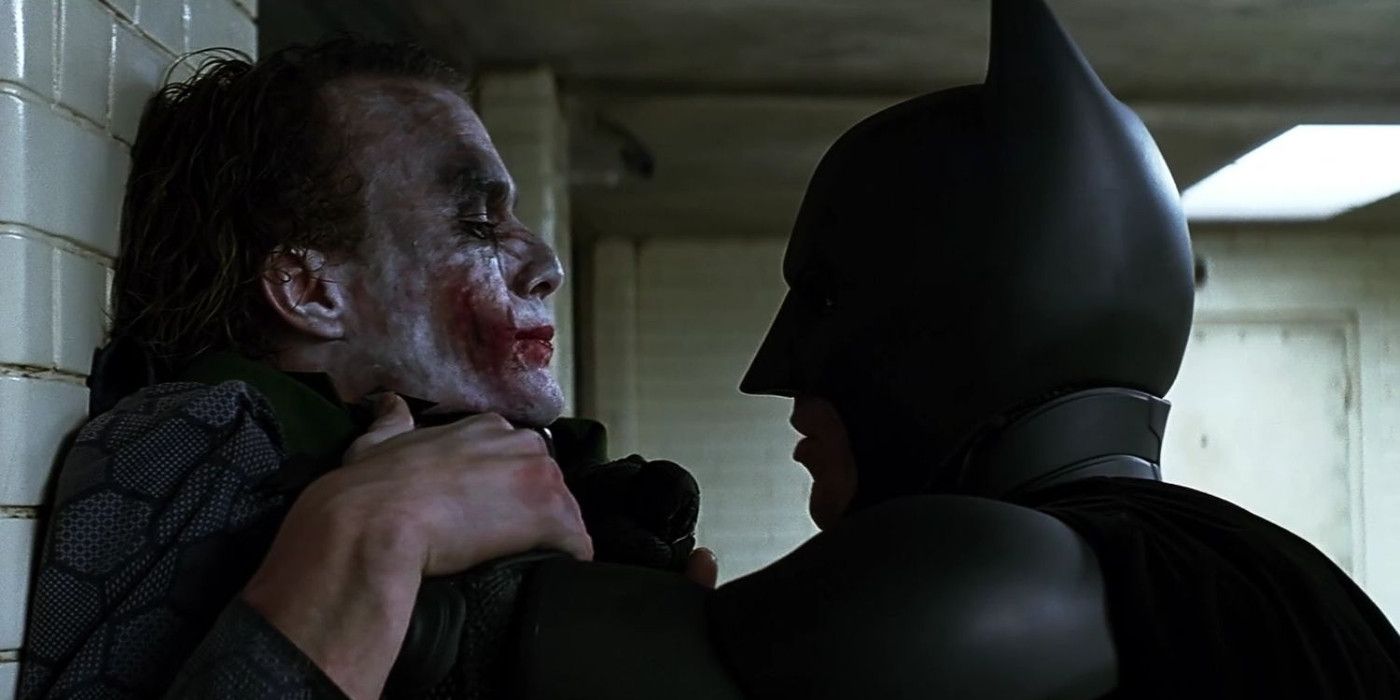Just how did he get those scars? Ten years after The Dark Knight unleashed Heath Ledger's Joker on audiences, the question of his character's origin remains. In that time, there have been countless theories, but one has consistently been cited, albeit often over-simplified. As Christopher Nolan's Batman epic hits double digits, it deserves a proper deep dive.
The Dark Knight remains a pinnacle of blockbuster cinema, having changed how superhero movies are viewed artistically, popularising the gritty realism style as popcorn entertainment, and solidifying the Christopher Nolan approach to hiring directors. Above all, it's a great movie. There's a lot of reasons for its legacy, but on a basic reactionary level, the standout aspect has to be Heath Ledger's Joker. His take on The Clown Prince of Crime is now the gold standard for not just superhero villains but screen villains in general. Hans Landa, Loki, Kylo Ren, Killmonger: any great modern turn will inevitably get comparisons to Ledger's Oscar-winning performance. And for good reason; like Darth Vader or Hannibal Lecter before him, he speaks to something inescapably and unknowingly terrifying just out of eyeshot in the real world.
Related: Every Christopher Nolan Movie, Ranked
That mystery is so key to the fear, and unlike Vader or Hannibal who both had prequels that retroactively attempted to explain how these black hearts came to be corrupted (the Star Wars prequels and Hannibal Rising respectively), Ledger's Joker never got any explanation. Indeed, that's a key part of his character. Throughout the film, Joker asks "Do you want to know how I got these scars?", each time giving a different (unrequested) account that lightly plays with his reading of the victim and their fears: criminal Gambol hears of domestic abuse; Rachel an unrequited love; and Batman, a man defined by fear, cuts him short.
Like The Killing Joke version, Nolan's Joker on the face of it seems to ascribe to the theory that "If I'm going to have a past, I prefer it to be multiple choice". However, in actuality, it's an illusion of choice. There is no past to speak of; he has no fingerprints, no aliases, no history of any kind. In the world of The Dark Knight Trilogy, it's as if the Joker simply came to be, with the closest we get to an origin story coming at the end of Batman Begins, when Gordon discusses the inevitable escalation caused by the arrival of The Batman to Gotham, citing the Joker as the first of a new wave of criminals. And that aspect, teased long before Ledger was even cast, is the key to this interpretation. One that, unlike a lonely slave or tortured boy, actually improves our reading of the character.
- This Page: What Exactly Is The Dark Knight' Joker?
- Page 2: The PTSD-Sufferer Joker Theory
- Page 3: Why This Is The Only Origin Theory That Works
The Dark Knight's Joker Was A Villain For The 2000s
The Dark Knight may have an influence that can still be felt today, but it is - along with the other two entries of The Dark Knight Trilogy - undoubtedly a product of the 2000s. Released in 2008, the film came at the end of George W. Bush's second term at a point where the safety of domesticity was being eroded. America was engaged in multiple conflicts in the Middle East leading to images of injured soldiers all over the news, and it was also only seven years on from the 9/11 terrorist attacks. The threat at home - both physical and emotional - loomed large.
The Joker explicitly preys on those fears, striking at the heart of Gotham (and by extension America) with acts of not just extreme violence, but randomness. Joker has a plan, evidenced in The Dark Knight's twisting middle act, but he attacks with no goal greater than breaking the spirit of Gotham; he's operating on a different plane and so becomes utterly unstoppable. This chaos is a constant Joker trait across his 75-year history, but it's his defining aspect in Nolan's version, to the point the teaser trailer is simply Alfred's "Some men just want to watch the world burn" speech over a slowly disintegrating bat symbol. Against the backdrop of Bush, this is presented as the true way to damage society.
Related: Behind The Scenes Secrets About Heath Ledger's Joker
However, the Joker is an American himself. He is not simply an extended parallel to Al Qaeda and 9/11 (unlike many other direct riffs from the time, such as Cloverfield). And that creates something more unsettling: the danger at home comes from home, within the city gates. We don't just fear what he can do, we fear over how little he may be removed from us. What drove him that way? What destroyed the American Dream?
Page 2: The PTSD-Sufferer Joker Theory
The Definitive Fan Theory: Joker Is A Former Soldier With PTSD
A commonly cited answer is that The Dark Knight's Joker is a direct product of the conflict we've established him as critiquing; that he is a veteran of either the Iraq War or War in Afghanistan suffering from PTSD and taking it out on the world that "created" him. Given how tight Nolan is on giving up anything about his villain, most of the reasoning behind this theory is pure logic. It explains how the Joker has such an in-depth knowledge of explosives and firearms, and despite his slight figure is able to prove himself such a formidable fighter. On a more visceral level, it creates an immediate and damaging way for him to get those scars, already a twist on the classic Joker smile.
In terms of the text itself, there's his speech to Harvey Dent about "the plan", specifically the section, "If tomorrow I tell the press that, like, a gang banger will get shot or a truckload of soldiers will be blowing up, nobody panics because it's all part of the plan. But when I say that one little old mayor will die... well, then everyone loses their minds." It's been suggested that the spiel about the soldiers is an acknowledgment of where he came from, the distaste at how accepted war casualties are fueling his status as "an agent of chaos". While that's hardly firm evidence - Joker is full of proclamations of intent and greater motivation, and this one is particularly focused on tipping the scared District Attorney into becoming the vengeful Two-Face - it does serve as an explicit callout in the movie to the wider world state of the time and thus must be considered in the reading.
This has been extended recently by Patton Oswalt, who posits that along with the standard military knowledge, Joker's manipulation of Batman and the police during his interrogation hints at some professional training in military intelligence, with his grand plan being to probe Gotham City and attempt to prove his thesis on its ills (something Batman alludes to during their final conflict). Again, owing to the purposeful ambiguity, it's all circumstantial when it comes down to actual facts but this aspect unavoidably a backbone of the movie (his manipulation of fears and grander plan have already been discussed) and within the themes of the theory it slots in very neatly; military intelligence and the secrets therein unsettle similar to the truths behind these wars.
Related: All 6 Joker Movies DC Has In Development, Explained
So far, this is mostly supposition, yet how every step of connection links directly into the themes of what Joker represents makes it incredibly powerful - especially when looked at on a large scale.
Indeed, what's not often addressed is how this origin theory has been backed up by what Nolan did next. While Ledger had planned to return for a third movie, his untimely death stopped that. Instead, Tom Hardy's Bane would break the Bat in The Dark Knight Rises, a film which, like its predecessor, wasn't shy about embracing the world it entered. Released in 2012, the trilogy capper emerged from the ashes of the stock market crash, reframing Bane (and the League of Shadows) as a parallel to the Occupy movement. Again, the Batman villains were presented as the direct repercussions of America's unchecked lording of power, pop culture figures used as pointed metaphors.
Page 3: Why This Is The Only Joker Origin Theory That Works
Why This Is The Only Joker Origin Theory That Works
Moreso than any in-movie evidence, what makes this theory so captivating is that while it may seem to limit the unending possibilities of the ambiguous backstory, it actually strengthens the mythology of the Joker. Here's a character that, by this point in time, it's clear no definitive version can exist. Caesar Romero, Jack Nicholson, Heath Ledger and Jared Leto have all provided their own takes in live-action to varying responses, but even the ones contemporarily viewed as unbeatable (Nicholson and Ledger) are impossible to cite as fully embodying the full scope of the character as written. Mark Hamill's take from Batman: The Animated Series comes close, but even that's a product of its time and medium.
And that's kind of the point. Just as Batman is more symbol than man (a key, overriding theme of The Dark Knight Trilogy), the Joker is more than just a crazed asylum escapee. He's not one disgruntled citizen, but a representation of everything that the hero opposes. And the soldier, Bush-era Joker that Ledger seems to embody is the essential foil to Christian Bale's Bruce Wayne. To have the Man Who Laughs or a deranged gangster would be fitting in terms of source, yes, but when it comes to reflecting the times and capturing a modern audience, the 2008 world begged for something different.
Related: How Heath Ledger's Joker is The Ultimate Batman Antagonist
This reading makes him a more explicit product of the very grounded world Nolan created, and even more a dominant pivot in the story. After all, while Heath Ledger is undoubtedly the MVP of The Dark Knight, the decade-long discussion on the role and its legacy often misses that - like Hannibal Lecter and Darth Vader before him - these villains exist primarily to reflect on the protagonist's journey. Batman is taking on the ills of modern America and discovering that his moral code cannot match; via the corruption of Harvey Dent, it becomes clear that things can't be simply reset; the unstoppable force the Joker represents is too powerful.
The movie ends with Batman going into hiding, an attempt to break the cycle of escalation, but one wrought with sacrifice. It's impactful on a character level, but utterly shaking when read within the wider global context. The Dark Knight explores new battlegrounds, and having the real world parallel makes the message all the more pointed and real.
-
Ten years on, the notion that the Joker is a PTSD-suffering former-soldier is now widely known and, while no theorized origin for such an unknowable character can ever be resolutely confirmed, is undeniably the best. It not only gives logic (however unnerving) to his actions, it ties into the greater themes of The Dark Knight Trilogy and shapes how we read what it does to Batman.




